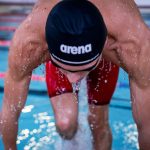Swimming and Asthma
Great swimmers of the past and present have suffered and still suffer from asthma, but this has not stopped them on their path to success.
Asthma (i.e. chronic inflammation of the airways) is considered to be the epidemic of the third millennium.
Approximately 6% of children ages six-eight suffer from it, with the symptoms worsening in case of emotional stress, cold, medication, dust, food and physical exercise.1
So, with the help of mathematics, you might think: (asthma + exertion)= danger!
Well, you would be wrong.
The place where you practice sport plays a crucial role: a warm and humid environment like a swimming pool greatly diminishes the pathology in question. Swimming actually helps reduce bronchoconstriction, which is one of the main symptoms of asthma.
If you ask your doctor or your son’s/daughter’s pediatrician which is the best sport for asthma sufferers, most likely their answer will be swimming.
HOW TO CONTROL ASTHMA:
– Ask your doctor or allergist whether you are fit for physical exercise. Be sure to test for allergies and asthma.
– Before any strenuous swimming, warm up properly and warm down slowly but effectively.
– Do not swim immediately after meals and/or taking medicine.
– Avoid swimming in cold water (bearing in mind that the normal temperature of the water in swimming pools should be between 77°F-83°F).
Stop any physical exercise if you are suffering from a respiratory infection (flu or cold) and ask your doctor when you will be ready to resume training.
The only inconvenience you might encounter, assuming you are hypersensitive to mildew, might be in the changing rooms where there could be mildew.
But don’t worry. All sports facilities, particularly swimming pools, undergo regular and careful checks by the relevant local specialists.
The bottom line is asthma is not an ailment will keep you away from sports. A sedentary lifestyle would be more harmful on a bronchial level.
And remember that almost one out of every 10 athletes who took part in the Olympics suffers from asthma. 2
A SHORT ANECDOTE
Looking at the results of the swimming races at the 2008 Beijing Olympics, 19.3% of the swimmers who used an inhaler for therapeutic reasons won 32.9% of all the water sports events. 3
Definitely a good result for asthma sufferers!
A study carried out by the University of Western Australia concludes swimming is the water sport with most asthma sufferers. In addition, more swimmers suffer from asthma than any other endurance athletes.
Asthma is no excuse for not trying out swimming and going back to math: (asthma + swimming) = victory.
Take a deep breath and dive in ready for our next article.
Sources:
1 University material from a Pharmacology course.
2 Study published by The British Journal of Sports Medicine.
3 Study published by the University of Western Australia and study by Fitch K., Therapeutic use exemptions (TUEs) at the Olympic Games 1992–2012.
Written by:
Marco Borreca
Marco Borreca was born in Milan in 1985. After his competitive swimming career, he continued his sports studies graduating from the faculty of Preventive and Adaptive Motor Sciences in Pavia. He has been working as a swimming/ fitness instructor and rehabilitation expert at various sports centres since he was very young. He mainly focuses on using water for recovering motor skills in the case of sports injuries and disabilities. He currently works for a municipal sports centre as the Head of Fitness and also works for a private practice as a kinesiologist.







